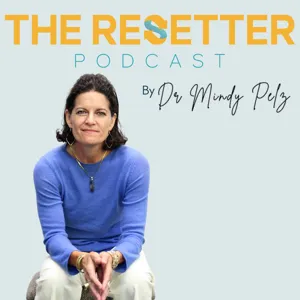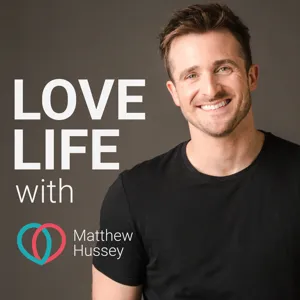Podcast Summary
Understanding Commitment Phobia in Relationships: Commitment phobia is a fear of taking relationships to the next level, often manifesting as avoidance or delaying tactics. It's crucial to distinguish between those who genuinely don't want commitment and commitment phobes to navigate the situation effectively.
Commitment phobia is a common issue in relationships, where one partner refuses to take the relationship to the next level despite expressing a desire for it. This fear of commitment can manifest in various ways, such as avoiding discussions about marriage or children, constantly postponing such steps, and offering reasons or excuses. It's essential to differentiate between someone who genuinely doesn't want commitment and someone who is a commitment phobe. The former has made a decision about their life, while the latter may be in a long-term relationship but unwilling to take it further. Understanding this dynamic can help both partners navigate the situation effectively. Additionally, recognizing the signs of commitment phobia can help individuals avoid entering relationships with people who may not be ready for a long-term commitment.
Navigating a Relationship with a Commitment Phobe: Commitment phobia can lead to emotional turmoil and uncertainty in relationships, particularly when one person wants to move forward while the other holds back. Consider if the relationship aligns with your goals and values.
Being in a relationship with a commitment phobe can be incredibly challenging and painful, particularly for the person who is not the commitment phobe. Commitment phobia, which can affect anyone regardless of gender, often results in a push-and-pull dynamic where one person wants to move the relationship forward while the other holds back. This inconsistency and uncertainty can be emotionally taxing, especially when one partner has a clear idea of what they want in life and feels stuck in the relationship. While commitment phobia is more commonly discussed in relation to men, it's important to remember that societal pressures and expectations can make things even more complicated for women. Ultimately, if you find yourself in a relationship with a commitment phobe, it may be worth considering whether the relationship is truly fulfilling and aligned with your goals and values.
Understanding the difference between someone who isn't fully committed and a commitment phobe: Commitment phobes display a pattern of sabotaging relationships and then returning, leading to long-term, dysfunctional relationships. Different from someone who isn't fully committed, who may just rank lower in priorities.
Not everyone who isn't fully committed in a relationship is a commitment phobe. Someone who is just not that into you may consistently rank lower in their priorities, while a commitment phobe will show love and commitment but then suddenly pull away. A commitment phobe's behavior can be damaging, with them going from being an incredible partner to a "bit of a dud" and then returning when they fear losing you. It's important to understand the difference between someone who isn't fully committed and someone with a commitment phobia. The latter displays a pattern of sabotaging the relationship and then returning when they feel they might lose you. This behavior can lead to long-term, dysfunctional relationships. If you're unsure about where you stand, it's essential to have open and honest communication with your partner.
Testing commitment with temporary departures: Commitment phobes may use temporary departures to test your commitment, potentially creating a cycle that's hard to break.
In relationships with commitment phobes, leaving isn't always about ending things permanently. Sometimes, it's a way to send a message and test their commitment. Commitment phobes often know this and will respond by being their best selves to win you back. However, this pattern can be problematic as it gives them a clear understanding of your triggers and the dynamics of the relationship. They learn that specific behaviors lead to your return, creating a cycle that can be hard to break. Commitment phobes typically don't initiate the breakup, preferring to let the other person pull the trigger while maintaining control over the intensity of the relationship.
Understanding commitment phobia's internal roots: Commitment phobia is an internal issue that requires self-reflection, therapy, and understanding root causes for lasting change, not external interventions or relationships.
Commitment phobia is a deeply ingrained issue that stems from within and cannot be changed by external factors or relationships. In a relationship, both partners need to consider each other's needs, but if one partner has a commitment phobia, they cannot expect the other person to "fix" them. Instead, they must be willing to do the work on themselves through therapy, self-reflection, and understanding the root causes of their fear of commitment. External interventions, such as interventions from family or friends, may raise awareness but ultimately do not bring about lasting change. People with commitment phobia often fear that the issue lies with their partner not being the right person, but this is not the case. Commitment phobia is an internal issue that requires internal solutions.
Childhood experiences shape attachment styles: Understanding childhood influences on attachment styles can lead to empathy and effective communication in relationships
Our childhood experiences significantly shape our attachment styles and beliefs about relationships, often forming patterns that carry on throughout our lives. Trauma, abandonment, loss, and modeling of fearful behaviors from parents can all impact how we approach relationships as adults. These patterns can be difficult to change, requiring self-awareness and the willingness to do the hard work of addressing past experiences. It's important to remember that only the individual can change their own beliefs and behaviors. As a partner or friend, we can offer support and encourage seeking professional help if needed. Understanding attachment theory and its impact on relationships can lead to greater empathy and effective communication in our relationships.
Understanding the root causes of deep-seated fears: Exploring childhood experiences and past traumas can help individuals overcome fears that hinder healthy relationships, creating a stronger bond with their partner.
Changing deeply ingrained beliefs and overcoming fears that stem from childhood experiences and past traumas is a challenging process. People with an inability to commit often hold onto these fears, avoiding the potential loss of self or control in relationships. They may see relationships as unsafe or not worth the risk, and their behavior can be selfish as they prioritize their own autonomy over the needs of their partner. This mentality is not consciously malicious, but it can be unfair and hinder the potential for healthy, fulfilling relationships. Understanding the root causes of these fears and providing a safe, supportive environment can help individuals work through them and build stronger connections.
Understanding Attachment Styles in Relationships: Recognizing attachment styles can help us navigate relationships, with secure attachment fostering growth and trust, while commitment phobia may lead to fear and sabotage.
The way we are raised and our attachment styles significantly impact how we approach relationships and handle vulnerability. Those raised with secure attachment believe in their inherent worth and that relationships can be a source of support and growth, even when they end. In contrast, individuals with commitment phobia may view relationships as a source of fear and rejection, leading them to sabotage connections and struggle to trust. It's essential to recognize that attachment styles are complex and influenced by various factors, not just upbringing. If you find yourself in a relationship with someone exhibiting these patterns, it's crucial to understand the underlying issues and consider whether continuing the relationship is beneficial for your personal growth. Without addressing the root causes, the cycle of commitment and withdrawal is likely to persist, potentially impacting future generations.
Fear of commitment in relationships: Recognize patterns of avoidance, communicate openly, prioritize the relationship, and leave if necessary for a healthier partnership.
Fear of commitment in relationships often stems from a deep-rooted fear or avoidance, and love alone is not enough to overcome it. People who fear commitment may put their own needs and priorities before their partner's, keeping them at arm's length. They may also have difficulty envisioning a future with their partner and may use secondary relationships or distractions to avoid intimacy. It's essential to recognize these patterns and communicate openly about them, as they can hinder the growth and success of a relationship. If a partner refuses to work on themselves and prioritize the relationship, it may be necessary to consider leaving and finding a healthier partnership. Additionally, be wary of red flags such as a partner who views you as an outsider or prioritizes their family above you in a committed relationship. These behaviors indicate a lack of trust and emotional availability, which can ultimately undermine the foundation of a healthy and fulfilling partnership.
Seeking validation from external sources keeps you stuck in unhealthy relationships: Recognize that a relationship consists of two people, both parties must take accountability for their actions, and seeking validation from others won't solve underlying issues.
In an unhealthy relationship, seeking validation from external sources, such as family and friends, can keep you stuck in the cycle of dysfunction. While it's natural to want support and understanding, constantly comparing your situation to others and expecting your partner to change based on outside pressure is not effective. Instead, it's essential to recognize that a relationship consists of two people, and both parties must take accountability for their actions. If you find yourself in a toxic relationship, consider having a tough conversation with your partner or making the decision to leave. The choice is yours, and the focus should be on your own happiness and well-being. Ultimately, it's crucial to remember that seeking validation from others will not solve the underlying issues in your relationship.
Seeking comfort in unhealthy relationships can hinder personal growth: Focus on personal growth and self-awareness to build healthy relationships, communication and honesty are essential foundations.
Individuals in unhealthy relationships often seek comfort and support from a network of friends and family, creating a cycle that may prevent personal growth and progress. It's crucial to break this cycle and make informed decisions about your relationship. Communication and honesty are essential foundations for any relationship, and if you're struggling with commitment, it's essential to address the root causes instead of stringing your partner along. It's unfair to expect someone to stay in a relationship that lacks commitment while you continue to work on yourself. Instead, focus on personal growth and self-awareness to build a healthy and loving relationship. Remember, the answer is always communication, and it's essential to be honest with yourself and your partner to create a strong foundation for your future.
Weighing priorities in a commitment-phobic relationship: Individuals must decide if they truly value their relationship or desired milestones, considering their personal desires and what feels right for them.
Individuals in a commitment-phobic relationship have to evaluate their priorities. If they truly love their partner but are unwilling to put them first, they must decide what they value more: the relationship or the milestones they desire, such as marriage and children. It's essential to ask oneself how badly one wants change and whether one is willing to leave the relationship to pursue these goals. Ultimately, the decision should be based on what feels right for the individual, not societal pressure or expectations. It's important to remember that there's no right or wrong answer, and everyone's situation is unique. By making an active decision, one can potentially stop resenting the relationship and enjoy it for what it is.
Consider taking action for change: Reflect, consider options, make decisions for personal well-being, be proactive, don't waste energy on unchangeable situations
Hope alone may not be enough to bring about change in situations beyond our control. Instead, it's essential to consider taking action and accepting new realities. The speaker emphasizes that if someone refuses to change despite our hopes, it's unlikely to happen without intervention. The podcast encourages listeners to reflect on their circumstances, consider their options, and make decisions based on their own well-being. The speaker also encourages listeners to join the Facebook group for further discussions and to share the podcast with those who might benefit from its insights. Overall, the message is to be proactive, kind to ourselves, and not to waste energy on hoping for change that may not come.






